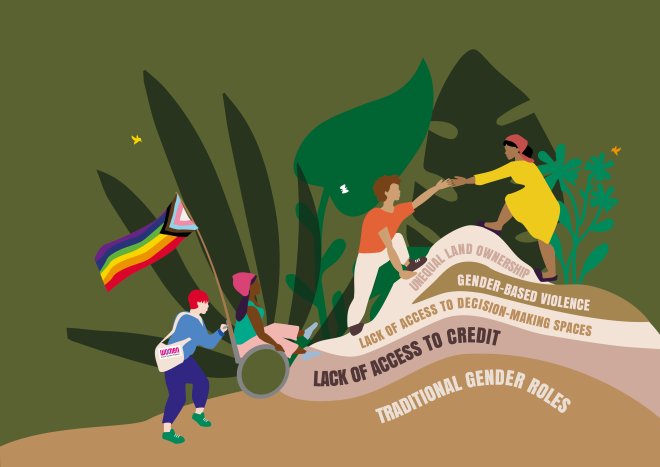
The Dutch Feminist Foreign Policy (FFP) is slowly beginning to take shape. Last week, the Dutch government informed the Parliament and the Senate of its initial intentions regarding the FFP, as well as its development process. WO=MEN Dutch Gender Platform is pleased that Article 1 of the Dutch Constitution, and thus the principle of equality, is one of the cornerstones of the future FFP. We call on the government to raise the bar even higher by coming up with a more ambitious Cabinet-wide vision.
In the progress letter Ministers Wopke Hoekstra (Foreign Affairs) and Liesje Schreinemacher (Foreign Trade and Development Cooperation) underscore that the government has chosen a Feminist Foreign Policy (FFP) on the basis of Article 1 (the principle of equality) and Article 90 (promotion of the international legal order) of the Dutch Constitution. The government rightly states that structural gender inequality still exists. Too often that is specifically the case for minority groups, such as LGBTIQ+ persons. Therefore, we once again applaud the fact that the goverment is opting for a policy that names and addresses this structural inequality.
The Netherlands previously announced that the Feminist Foreign Policy would be based on four R’s: Rights (protect women’s rights), Resources (funds must also be available for women), Representation (women must be involved in policymaking and policy implementation) and Reality Check (no unwanted negative consequences for women). A number of important commitments have now been added to that regarding what the Netherlands is going to do further, including:
= The root causes of unequal power structures will be examined and taken into account in policy considerations and decision-making. Men and boys will be actively involved in changing negative gender norms.
= A gender lens will be embedded in the policy cycle (further gender mainstreaming). Gender analyses must therefore become a standard part of strategic planning and policymaking.
= Gender budgeting will be the starting point for funding decisions. This means that gender analyses should also be part of decision-making regarding potential programme and grant expenditures.
Both ministers indicate that the Dutch FFP will be elaborated on in a handbook. This offers important opportunities. WO=MEN calls on the government to take further robust action, among other ways, by:
= Developing a governenment-wide vision on how the Netherlands wants to relate to the world. One element of this is that the government takes an in-depth look at the parts of its foreign policy that are at odds with feminist principles and speaks out about that. Examples of this include Dutch international trade policy, colonialism/decolonisation, capitalism and militarism.
= Strengthening the cooperation and improving the coordination with all relevant ministries responsible for foreign policy areas, including Economic Affairs & Climate Policy, Agriculture, Defence, Emancipation (Education, Culture and Science), Finance and Justice & Security.
= Ensuring that the gender lens mentioned is truly intersectional. In addition to gender, the lived realities of those people who are affected by the policy must be taken into account. Factors like age, ethnicity, sexual orientation, mental or physical impairment, religion and socioeconomic class, make a difference in (access to) rights and opportunities.
= Improving the commitment to policy coherence for development. At present, the Netherlands pursues policies in areas including raw material extraction, which actively harm the position and rights of women, girls and gender nonconforming persons. Apply the principles of the FFP concretely to policies that are currently being developed, such as the Africa strategy and the raw materials strategy.
= Making it clear that feminism is good for everyone. It is about the realisation that everyone within society is affected by social norms and values that largely determine opportunities for development and participation. As a result, structural inequalities are created and perpetuated. Feminist Foreign Policy should focus on breaking these unequal (power) relationships and bring about systemic change. That goes far beyond the aforementioned focus on empowering half the world's population within the very systems that have fostered structural inequalities.
In the coming period, additional consultations will take place. We are happy to contribute to this next step together with our members and partners. These consultations – in accordance with the learned lessons from a recent internet survey about the Dutch FFP – should be designed to be as inclusive as possible. Meaningful participation of (local) gender equality and women's rights organisations, youth and feminist networks is crucial if the new policies are to have any real chance of success. WO=MEN has developed a number of recommendations for this.
WO=MEN looks forward to working with members, partners and the government to make the first Dutch Feminist Foreign Policy a success, developed for and, above all, with those fighting for a just and equal world.
Interested to learn more?
Read the input from our working groups to a recent internet survey about the FFP organised by the Dutch Ministry of Foreign Affairs.
Suggestions from members and partners for the Dutch FFP:
= CMI!: "Be bold and ambitious”: Count Me In!’s recommendations for Dutch Feminist Foreign Policy